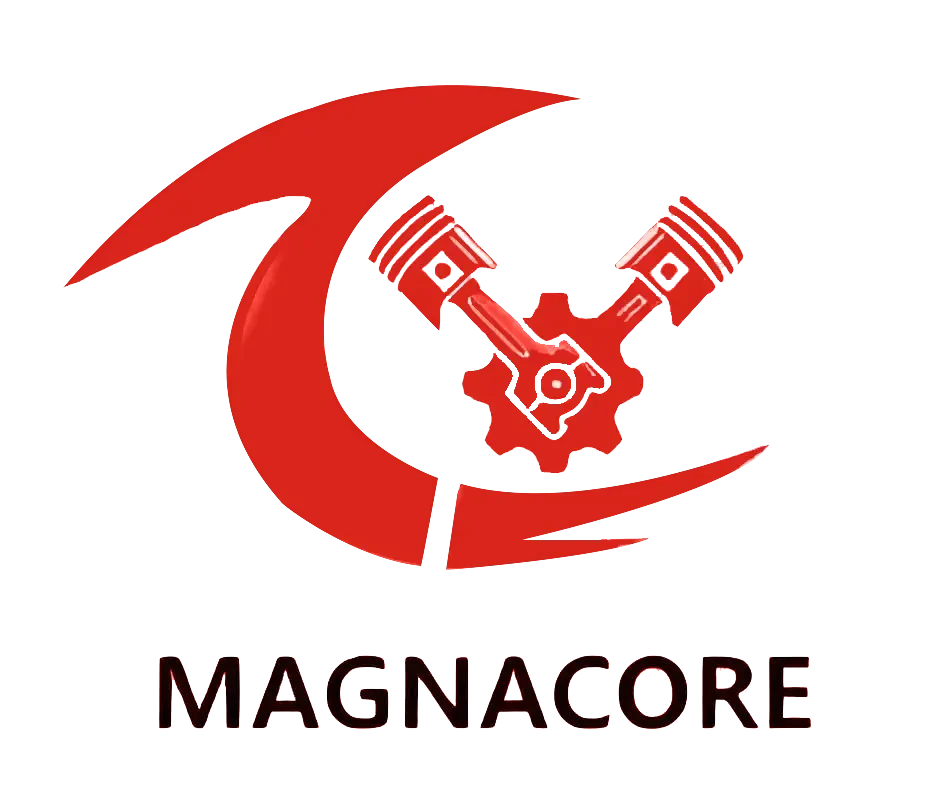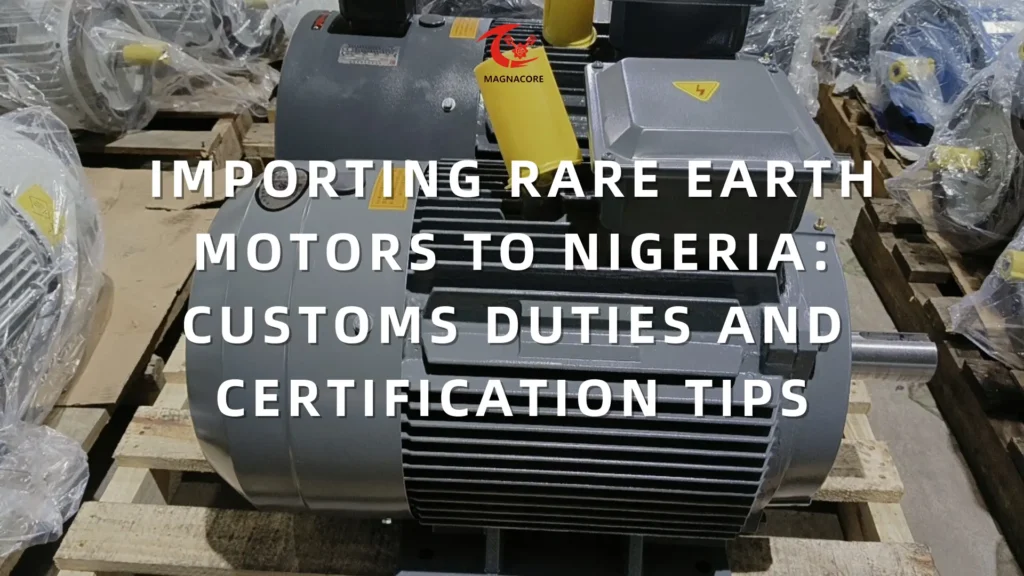Nigeria’s growing industrial and technological sectors are driving demand for high-efficiency rare earth motors.
However, importing these specialized components involves navigating customs duties, certifications, and regulatory compliance.
This guide breaks down the key considerations to ensure a smooth import process while avoiding unexpected costs and delays.
What Are Rare Earth Motors and Why Are They in Demand?
Definition and Key Features
Rare earth motors are advanced electric motors that utilize permanent magnets composed of rare earth elements, such as neodymium.
These unique materials enable the motors to achieve exceptional efficiency, a compact form factor, and a high power density.
Their design allows for smaller and lighter configurations, making them particularly appealing for applications where space and weight savings are critical, such as in electric vehicles and portable equipment.

Common Applications in Nigeria
In Nigeria, the demand for rare earth motors is on the rise, particularly in sectors like renewable energy and electric mobility.
These motors are becoming increasingly vital in solar power systems, where their efficiency translates to better energy capture and utilization.
Industrial machinery also benefits, as these motors provide reliable operation in demanding environments.
Moreover, HVAC systems leverage rare earth motors to improve energy efficiency, crucial for reducing operational costs in both residential and commercial settings.
Benefits Over Conventional Motors
Rare earth motors present several advantages compared to conventional induction motors.
One of the most significant benefits is their lower electricity consumption, which directly translates to cost savings on energy bills.
Their longevity is another key factor, as rare earth motors often outlast traditional motors, making them a wise investment despite the higher initial purchase cost.
This combination of efficiency, reliability, and cost-effectiveness highlights why businesses are increasingly turning to rare earth motors.
Also Read:
- Rare Earth PMS Motors Are Revolutionizing Electric Vehicle Manufacturing
- Revolutionizing Wind Turbines: Rare Earth PMS Motors in Renewable Energy
- Breaking Down the 20% Energy Savings of Rare Earth PMSM in Industrial Pumps
What Are the Import Regulations for Rare Earth Motors in Nigeria?
Overview of Nigerian Import Laws
Nigerian import regulations are primarily enforced by the Nigeria Customs Service (NCS) and the Standards Organization of Nigeria (SON).
Importers must navigate a complex landscape of tariffs, documentation, and product standards to ensure compliance.
Understanding the legal framework is essential for a smooth import process, as failure to adhere to regulations can result in delays, fines, or even confiscation of goods.
Restricted or Prohibited Motor Types
While the importation of rare earth motors is generally permitted, certain models—especially those with high power ratings or specialized features—may be subject to additional scrutiny and regulation.
It is essential for importers to verify any restrictions that may apply to specific motor types before proceeding with shipments.
Engaging with customs authorities or consulting with a logistics expert can help clarify any potential issues, ensuring that shipments are not halted or confiscated upon arrival.

Required Import Licenses
Importing rare earth motors into Nigeria often necessitates obtaining various licenses and certifications.
Importers may need to secure an SONCAP (Standards Organization of Nigeria Conformity Assessment Program) certificate, which confirms that the product meets Nigerian standards.
If applicable, importers may also need an Import Duty Exemption Certificate to minimize costs.
Having all necessary documentation prepared in advance can significantly streamline the import process and mitigate the risk of delays.
How Much Are Customs Duties and Taxes for Rare Earth Motors?
Breakdown of Import Duties
Rare earth motors are categorized under HS Code 8501, which encompasses electric motors and generators.
The customs duty rate for these motors varies, typically ranging from 5% to 20%.
The exact rate depends on factors such as the motor’s power rating and its intended application.
Additional Levies
In addition to the customs duties, importers of rare earth motors are responsible for several additional taxes and levies.
A 7.5% Value Added Tax (VAT) is applied to the total value of the imported goods, significantly impacting overall costs.
Furthermore, there is a 0.5% levy under the Economic Community of West African States Trade Liberalization Scheme (ETLS), which aims to promote intra-regional trade.
All these fees can accumulate, so it’s crucial for importers to account for them when budgeting.
Strategies to Reduce Costs
To mitigate the financial burden of importing rare earth motors, several strategies can be employed.
One effective approach is to seek duty waivers, particularly for projects related to renewable energy, as governments often provide incentives to support sustainable initiatives.
Another option is bulk purchasing, which can lower the per-unit cost and make it more economical to import larger quantities.
Utilizing bonded warehouses for temporary storage can also be beneficial, allowing importers to defer duty payments until the goods are sold or processed.

What Certifications Are Required for Rare Earth Motors?
SONCAP Certification
The Standards Organization of Nigeria Conformity Assessment Program (SONCAP) certification is crucial for ensuring that rare earth motors meet Nigeria’s safety and performance standards.
This certification must be obtained before the motors can be cleared through customs.
The SONCAP process involves a thorough assessment of the products, verifying that they comply with Nigerian regulations.
Importers should initiate this process early to avoid delays in clearance, as securing SONCAP certification can be time-consuming and requires proper documentation.
NAFDAC Approval
For rare earth motors intended for use in medical or food-related equipment, obtaining approval from the National Agency for Food and Drug Administration and Control (NAFDAC) is essential.
This approval ensures that the motors meet specific safety and efficacy standards relevant to these sensitive applications.
Importers of such motors must navigate the NAFDAC approval process, which may involve additional testing and compliance documentation.
Testing and Compliance Reports
To expedite the certification process, suppliers should provide comprehensive testing and compliance reports for rare earth motors.
These reports may include certifications such as IEC (International Electrotechnical Commission), CE (Conformité Européenne), or RoHS (Restriction of Hazardous Substances) compliance.
Having these documents readily available can significantly streamline the certification process, helping importers to clear customs more efficiently.
And More:
- Top Factors to Consider When Buying Rare Earth PMS Motors for Your Business
- Rare Earth Permanent Magnet Motor Supplier in China
How to Choose a Reliable Supplier for Rare Earth Motors?
Verifying Supplier Credentials
Start by checking for ISO certifications, which indicate that the supplier adheres to international quality management standards.
This can provide confidence in their manufacturing processes and product consistency.
Compliance with international standards, such as IEC or CE certifications, is also essential, as it ensures that the products meet necessary safety and performance criteria.
Conducting thorough background checks can help mitigate risks associated with subpar suppliers.

Negotiating Pricing and Shipping Terms
Negotiating favorable pricing and shipping terms is vital for a successful import process.
Opt for Free on Board (FOB) or Cost, Insurance, Freight (CIF) terms to clearly delineate responsibilities between the buyer and the seller.
With FOB, the supplier is responsible for costs until the goods are loaded onto the shipping vessel, after which the buyer assumes responsibility.
Clearly defined terms can help avoid misunderstandings and unexpected costs, ensuring a smoother transaction.
Ensuring Proper Documentation
Proper documentation is essential for a seamless import process. Suppliers must provide a comprehensive commercial invoice detailing the transaction, including product descriptions, quantities, and prices.
A packing list is also crucial, as it outlines the contents of each shipment and assists customs officials during inspections.
Ensuring that all required documents are accurate and complete can prevent delays at customs and facilitate a smoother importation process.
What Are the Shipping and Logistics Considerations?
Best Shipping Routes to Nigeria
When planning the import of rare earth motors, selecting the best shipping routes to Nigeria is essential for efficiency and cost-effectiveness.
Major ports such as Lagos, specifically Apapa and Tin Can Island, and Onne Port are ideal entry points for motor imports.
These ports are equipped to handle large volumes of cargo and have the necessary infrastructure to support efficient customs processing.
Handling and Storage Requirements
Rare earth motors require careful handling and storage to maintain their performance and integrity.
They must be packed securely to prevent demagnetization, which can occur if they are exposed to strong magnetic fields or improper handling.
Proper storage conditions, such as controlled temperature and humidity, are also critical.
Importers should work with logistics partners who understand these specific requirements to ensure that the motors arrive in optimal condition.

Dealing with Customs Delays
Customs delays can significantly impact the importation timeline, so it’s important to have strategies in place to address potential issues.
Working with a licensed customs agent can facilitate the process, as they are experienced in handling inspections and paperwork efficiently.
A customs agent can help ensure that all documentation is in order and assist in navigating any regulatory challenges that may arise.
How to Clear Rare Earth Motors Through Nigerian Customs?
Required Customs Documents
To successfully clear rare earth motors through Nigerian customs, several essential documents must be prepared.
The Bill of Lading or Air Waybill serves as proof of the shipment and outlines the terms of transport, detailing the consignee and consignor information.
A Form M is required, which is a declaration form issued by an authorized bank, indicating the intent to import the goods and facilitating the payment process.
Ensuring all these documents are accurate and complete is vital for a smooth customs clearance process.
Customs Inspection Process
Once the necessary documents are submitted, the customs inspection process begins.
Rare earth motors may undergo a physical examination or be subjected to scanning by customs officials to verify compliance with regulations and confirm the accuracy of the declared information.
During a physical inspection, customs officers will check the actual goods against the provided documentation to ensure consistency.
Importers should be prepared for this process by ensuring that their shipments are accessible and that all relevant documentation is readily available for review.
Avoiding Common Clearance Mistakes
To avoid complications during the customs clearance process, importers should be aware of common pitfalls.
One major mistake is the incorrect HS code classification, which can lead to improper duty assessments and potential penalties.
It’s essential to accurately classify the rare earth motors under the correct HS code to ensure compliance with customs regulations.
Another common error is under-declaring the value of the motors to evade higher duties, which can result in severe penalties if discovered. Importers should provide an honest and accurate valuation to avoid complications.

What Are the Post-Importation Requirements?
Storage and Distribution Best Practices
After clearing customs, proper storage and distribution of rare earth motors are key to maintaining their integrity.
Motors should be stored in dry, temperature-controlled environments to prevent corrosion and damage.
High humidity and extreme temperatures can adversely affect the motors’ performance and longevity. Using moisture-absorbing materials and ensuring adequate ventilation in storage areas can mitigate these risks.
Warranty and After-Sales Support
Securing warranty coverage and after-sales support from suppliers is essential for protecting your investment in rare earth motors.
Importers should ensure that suppliers offer comprehensive warranty options that cover defects in materials and workmanship.
Local technical support is also crucial, as it provides timely assistance for installation, maintenance, and troubleshooting.
Having access to knowledgeable support personnel can significantly enhance operational efficiency and minimize downtime in case of issues.
Conclusion
Importing rare earth motors into Nigeria requires careful planning around duties, certifications, and logistics.
By understanding regulatory requirements, choosing reputable suppliers, and working with experienced customs agents, businesses can streamline the process and maximize their investment.
Stay informed on policy changes to adapt your import strategy for long-term success.

